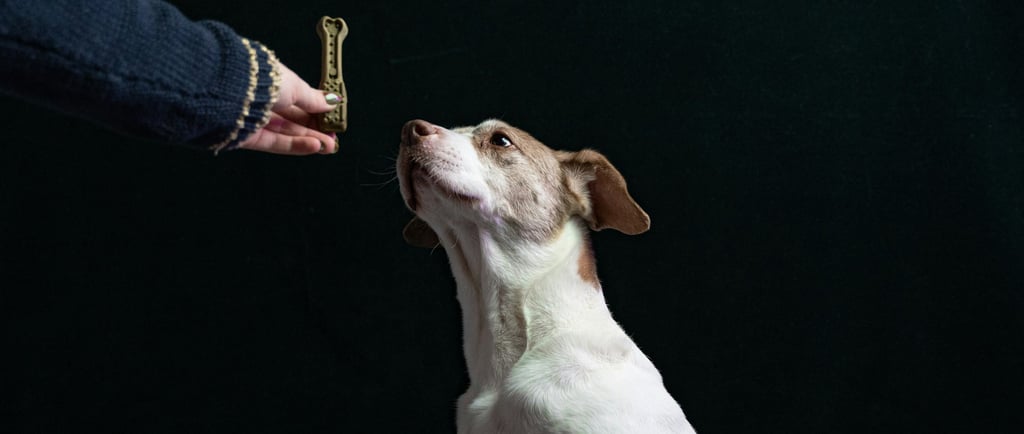
When to Phase Out Dog Training Treats - Expert Timeline & Tips
Wondering when your dog will listen without treats? Discover the perfect timeline to phase out rewards and build lasting obedience with expert advice from Charleston Pet Nanny.
PET TRAINING TIPSPOSITIVE REINFORCEMENTCHARLESTON DOG LIFE


🐾 “Will I always need treats to get my dog to listen?”
Wondering when your dog will listen without treats? Discover the perfect timeline to phase out rewards and build lasting obedience with expert advice.
If you're wondering when your furry friend will obey commands without expecting a tasty reward every single time, you're not alone! The journey from treat-dependent training to reliable obedience is one of the most rewarding milestones in pet parenthood. Let's dive into the complete timeline and strategies for successfully phasing out treats! 🎯
Why Treats Are Essential in Early Dog Training 🌟
The Foundation Phase: Building Success
When you first bring home your adorable new puppy, treats aren't just helpful—they're absolutely crucial for effective training. Here's why:
Critical Learning Windows:
3-12 weeks: Prime socialization period 🧠
Maximum learning capacity during early development
Positive associations form quickly with high-value rewards
Trust building between you and your pup
During the pup's early coordination stage (7-9 weeks), their world is expanding rapidly. Those frequent treat rewards help your buddy:
Focus despite distractions 👀
Associate good behavior with positive outcomes ✅
Build confidence in new situations 💪
Strengthen your bond together ❤️
The Perfect Timeline: When to Start Phasing Out Treats 📅
Stage 1: Foundation Building (8-16 weeks)
Treat Frequency: Every successful command ⭐
Focus: Establishing basic commands like "sit," "stay," "come"
Goal: Building positive associations and trust
Stage 2: Consistency Development (4-6 months)
Key Signs Your Dog is Ready:
✅ Consistently obeying commands without hesitation
✅ Shows engagement beyond just the treat
✅ Responds reliably in familiar environments
✅ Displays enthusiasm for training sessions
Treat Frequency: Begin intermittent reinforcement (every 2-3 successful responses) 🎲
Stage 3: Mastery Phase (6-18 months)
Treat Frequency: Occasional rewards for mastered commands
Focus: Transitioning to alternative reward systems
Goal: Independent obedience without food dependency
Smart Strategies for Phasing Out Treats Successfully 🧠
The Intermittent Reinforcement Method
Instead of going cold turkey, try this proven approach:
Week 1-2: Reward every other successful command
Week 3-4: Reward every third successful command
Week 5+: Random reward schedule (keeps them guessing!)
Powerful Treat Alternatives That Work 🎉
Verbal Praise Power:
Enthusiastic "Good job, buddy!" 📢
Consistent tone and energy
Immediate timing with behavior
Physical Affection:
Extra cuddles and pets 🤗
Belly rubs for relaxed moments
Gentle scratches behind the ears
Play-Based Rewards:
Brief tug-of-war sessions 🧸
Favorite toy interaction
Quick game of fetch
Life Rewards:
Access to favorite spots
Permission to greet other dogs
Freedom to explore new areas
Charleston-Specific Training Tips for Busy Pet Parents 🌴
Living the Lowcountry Lifestyle
Between work commitments and enjoying our beautiful Charleston scenery, maintaining consistent training can be challenging. Here are practical solutions:
Travel & Boarding Prep 🧳
Teach marker words like "good" alongside treats
Practice commands with family members
Create training consistency sheets for pet sitters
Meal-Based Training Hacks 🍽️
Use regular kibble as training treats
Incorporate training into feeding time
Prevent overfeeding while maintaining motivation
Outdoor Training Advantages 🌊
Utilize Charleston's dog-friendly beaches
Practice recall in fenced dog parks
Use environmental rewards (sniffing, exploring)
Common Mistakes to Avoid ⚠️
The "Cold Turkey" Trap
Never abruptly eliminate treats! This can cause:
Confusion and regression 😕
Loss of motivation
Damage to your training progress
Potential behavioral setbacks
Individual Dog Considerations 🐕🦺
Breed-Specific Factors:
Larger breeds may need extended training periods
Working breeds often require mental stimulation rewards
Food-motivated breeds may need slower transitions
Personality Variations:
Anxious dogs benefit from longer treat phases
Confident dogs may transition faster
Rescue dogs might need extra patience and consistency
Advanced Training: Beyond Basic Commands 🎓
Maintaining Long-Term Success
Even after phasing out treats for basic commands, remember:
Complex Behaviors: New tricks and advanced training still benefit from treat rewards 🎪
Refresher Training: Occasional treat sessions maintain enthusiasm 🔄
Challenging Situations: High-distraction environments may require temporary treat use 🎯
Professional Support When You Need It 👥
Charleston Pet Nanny's Expert Perspective
Training is a lifelong journey, not a destination! Some dogs need extra support, and that's perfectly normal. Whether you're dealing with:
Stubborn training plateaus
Behavioral challenges
Busy schedule constraints
Travel preparation needs
Our experienced pet care professionals understand the unique challenges Charleston pet parents face. We're here to provide consistent, loving support that reinforces your training efforts.
Your Next Steps to Training Success 🚀
Action Plan for This Week:
Assess your dog's current consistency level 📊
Choose 1-2 alternative rewards to introduce 🎁
Start intermittent reinforcement with mastered commands ⚡
Document progress to track success 📝
Remember: Every dog progresses at their own pace. Your little buddy might be ready to phase out treats at 5 months, while another pup might need treats until 8 months. Trust the process and celebrate small victories! 🎉
The goal isn't to eliminate positive reinforcement—it's to expand your reward toolkit and create a well-rounded, happy, obedient companion who responds out of love and respect, not just hunger! 💕
